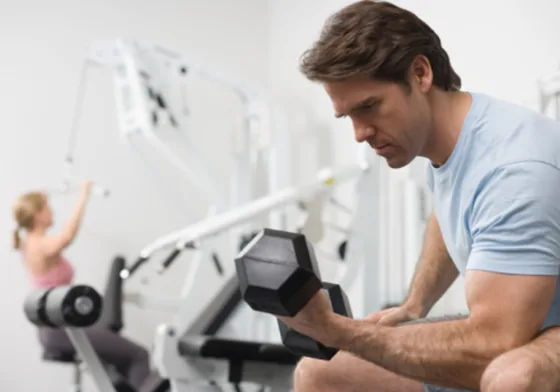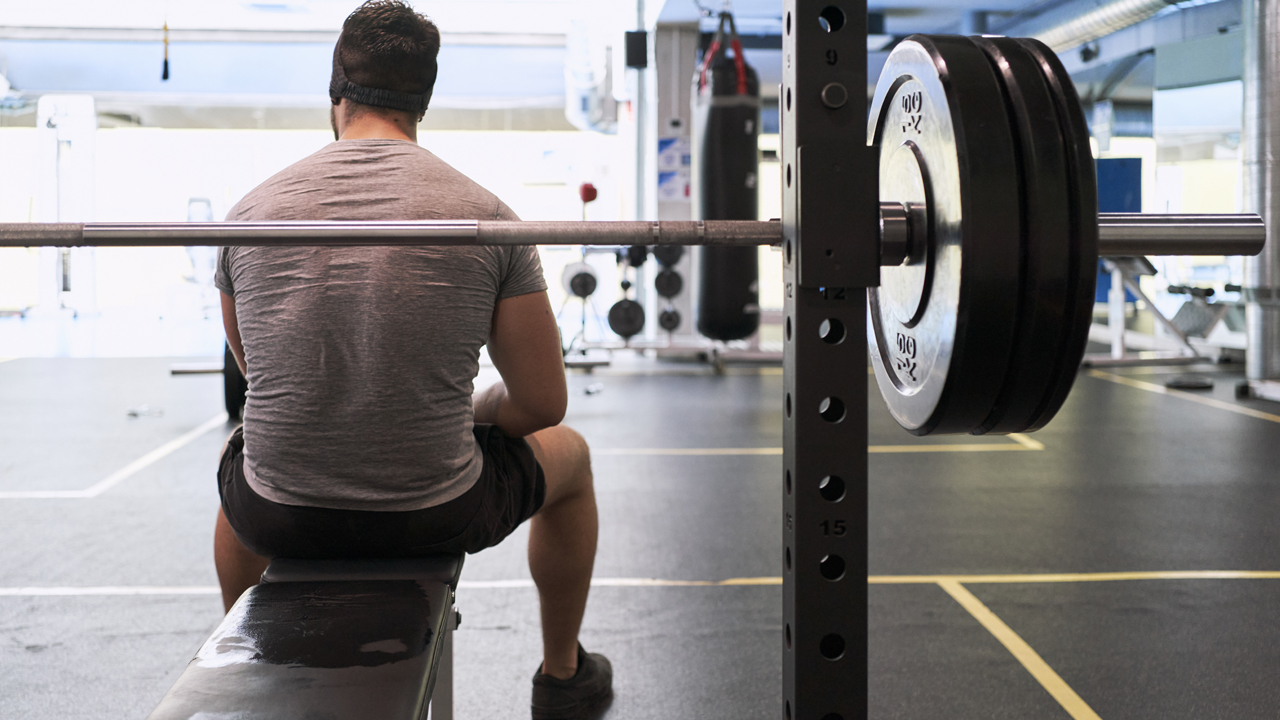In today’s fast-paced world, many men are seeking natural ways to enhance their vitality, energy, and sexual health — and one question that’s gaining attention is: Can lifting weights actually boost male libido? While weight training is already praised for building muscle and improving physical appearance, research suggests that it may also offer powerful benefits for hormonal balance, confidence, and yes — sexual desire.
Libido, or sex drive, isn’t just about what happens in the bedroom. It’s deeply connected to a man’s overall physical and mental health. Low libido can stem from stress, poor sleep, low testosterone levels, or even poor body image — all of which weightlifting may help improve. But how strong is the link between strength training and sexual desire? And can regular trips to the gym really make a difference in a man’s love life?
Recommended: Are Cold Showers Helpful for Testosterone Production?
In this blog, we’ll dive deep into the science and real-life insights behind this question — breaking down exactly how lifting weights may naturally rev up a man’s libido.
What Drives Male Sexual Desire?
Male sexual desire, or libido, is influenced by several powerful forces, each playing a unique role in shaping a man’s interest in intimacy. Understanding these key factors makes it easier to see how lifestyle choices—like lifting weights—can make a difference.

1. Hormones
The most important hormone involved in male libido is testosterone. This hormone drives much of a man’s physical and sexual energy. When testosterone levels are high, desire typically increases. If those levels drop due to age, chronic stress, illness, or inactivity, a man’s interest in sex can decrease significantly. In addition to testosterone, brain chemicals like dopamine—associated with pleasure and reward—help fuel sexual motivation. Other hormones like serotonin and oxytocin influence emotional bonding and mood, which indirectly support a healthy sex drive.
Recommended: Is Intermittent Fasting Good for Men’s Sexual Health?
2. Mental and Emotional Health
A man’s mental state has a huge impact on his libido. High levels of stress, anxiety, or depression can lower sexual desire, regardless of how physically healthy a person may be. These mental health challenges interfere with the brain’s ability to generate excitement or desire. Also, self-esteem plays a role; men who feel confident about their bodies and their worth are more likely to experience stronger, more consistent sexual interest.
3. Sleep and Recovery
Good quality sleep is essential for hormone production—especially testosterone. During deep sleep, the body repairs itself and produces the hormones necessary for sexual function. Men who consistently sleep poorly or not enough often see a drop in testosterone and libido. Recovery from physical and mental stress, including taking time to rest and relax, is also essential for maintaining desire.
4. Physical Health and Nutrition
A healthy body supports a healthy libido. When a man eats a balanced diet rich in vitamins, minerals, and essential nutrients, his hormone systems and blood circulation function properly—both of which are vital for sexual performance. On the other hand, poor diet, obesity, and health problems like diabetes or high blood pressure can reduce blood flow and lower testosterone levels, leading to decreased sexual interest and ability.
5. Relationship and Emotional Connection
Lastly, emotional intimacy is another crucial factor. Libido isn’t only driven by physical urges—it also depends on the connection between partners. In committed relationships, strong communication, trust, and emotional closeness often keep sexual desire alive. When emotional bonds are weak or strained, desire can decline even if hormones and health are in good shape.
Recommended: Is Lack of Sleep Affecting My Testosterone Levels?
Strength Training and Testosterone: What’s the Connection?
Testosterone is the powerhouse hormone behind male strength, energy, confidence, and sexual drive. One of the most natural ways to support and even boost testosterone levels is through strength training, also known as resistance or weight training. But how exactly are lifting weights and testosterone linked?
When you engage in strength training, especially exercises that target large muscle groups—like squats, deadlifts, and bench presses—your body responds by releasing more testosterone. This is part of your body’s natural way of repairing muscle fibers and preparing for future physical demands. As a result, regular resistance training can lead to higher baseline testosterone levels over time, especially in men who are new to working out or returning after a long break.
However, the connection doesn’t stop at hormones. Building muscle also improves body composition, meaning a better ratio of muscle to fat. This is important because excess body fat—particularly around the belly—can actually convert testosterone into estrogen through an enzyme called aromatase. So, the more lean muscle you build and the more fat you burn, the more favorable your hormonal environment becomes.
Strength training also enhances insulin sensitivity, supports better sleep, reduces stress, and boosts endorphin levels—all of which work together to help stabilize testosterone production naturally. The cumulative effect of these benefits can lead to a noticeable improvement in energy, mood, and libido.
It’s important to note that more isn’t always better. Overtraining or lifting without adequate recovery can cause testosterone levels to drop due to increased cortisol, the stress hormone. That’s why it’s essential to follow a well-balanced routine that includes rest days and good nutrition.
How Lifting Weights Helps Balance It All

Many men don’t realize that sexual health isn’t only about testosterone — it’s also about the delicate balance between stress, sleep, and overall recovery. These three pillars affect everything from mood and mental clarity to energy levels and sexual desire. Fortunately, lifting weights plays a surprisingly powerful role in helping the body and mind stay balanced and resilient.
Recommended: Natural Ways to Increase Testosterone for Better Male Vitality
Stress is one of the biggest enemies of male libido. When stress levels are high, the body releases more cortisol, a hormone that, in large amounts, directly lowers testosterone. This imbalance can reduce libido, motivation, and even physical performance. Weight training, especially when done regularly but not excessively, helps lower cortisol levels after workouts and increases the release of endorphins — the “feel-good” hormones that improve mood and reduce stress naturally.
Sleep is another crucial factor. During deep sleep, the body releases most of its testosterone and growth hormone. Without enough quality rest, hormone production drops, and libido can follow. Interestingly, strength training promotes better sleep by helping the body feel physically tired in a healthy way. Studies show that people who engage in resistance training tend to fall asleep faster and enjoy deeper, more restorative sleep compared to those who don’t exercise at all.
Also, strength training improves mental clarity and emotional stability. After a good workout, many people report feeling more relaxed, focused, and in control of their emotions. This calm, confident mental state plays a huge role in how men perceive themselves and their relationships — both of which influence sexual desire.
How to Start Lifting for Libido and Hormonal Health
If you’re new to strength training and curious about how it can support your libido and hormonal balance, the good news is — you don’t need to be a bodybuilder to enjoy the benefits. Getting started is simpler than you might think, and with the right routine, you can naturally improve your testosterone levels, energy, and sex drive.
1. Focus on Compound Movements
When it comes to boosting testosterone and building muscle efficiently, compound exercises are king. These are multi-joint movements that target large muscle groups, which place greater demands on the body — and that demand triggers a stronger hormonal response. Start with exercises like squats, deadlifts, bench presses, overhead presses, pull-ups, and rows. You don’t need to lift heavy right away — proper form is more important than weight, especially in the beginning.
Recommended: Which Specific Herbs (Like Ashwagandha, Maca, or Tongkat Ali) Are Most Effective for Sperm Quality Improvement?
2. Train 3 to 4 Times a Week
Consistency beats intensity. Training three to four times a week allows you to stimulate your muscles and hormones without overtraining, which can actually backfire and increase stress hormones like cortisol. A balanced schedule might look like:
- Day 1: Upper body (push)
- Day 2: Lower body
- Day 3: Rest
- Day 4: Upper body (pull)
- Day 5: Full body or cardio/light recovery
This frequency gives your body time to rest and rebuild — the exact process that supports testosterone production and libido.
3. Don’t Skip Recovery
Lifting weights stresses your muscles in a good way, but recovery is where the real growth happens — both for your body and your hormones. Prioritize 7–9 hours of quality sleep each night, drink plenty of water, and eat protein-rich meals to support muscle repair and hormone function. Taking a rest day or doing light activity (like walking or stretching) can also help avoid burnout and overtraining.
4. Eat to Support Hormonal Health
What you eat matters. Diets rich in whole foods, healthy fats (like avocados, nuts, and olive oil), lean proteins, and complex carbs fuel your workouts and help your body produce testosterone naturally. Avoid processed junk foods and excessive alcohol, as they can disrupt hormone levels and reduce libido.
5. Track Progress Without Obsessing

You don’t need to be obsessed with numbers on the scale or in the gym. Instead, track how you feel: Is your energy better? Do you sleep more soundly? Do you feel more confident and in control? These are signs that your training is working — even if your biceps aren’t bulging (yet).
6. Consider Professional Guidance
If you’re completely new to strength training, consider starting with a fitness coach or using a beginner-friendly workout app to guide your form and program. This reduces injury risk and keeps you motivated.
When Weight Lifting Might Hurt Your Libido
While weight lifting is often praised for boosting testosterone and enhancing male libido, it’s important to understand that too much of a good thing can backfire. Like anything in life, balance is key. When done incorrectly or excessively, strength training can actually hurt your hormonal health, decrease your energy, and lower your sex drive.
Recommended: Does Sermorelin Increase Libido?
1. Overtraining and Hormonal Imbalance
One of the biggest mistakes men make is thinking “more is better.” But when you train too hard, too often, and don’t give your body time to recover, you enter a state called overtraining syndrome. In this state, your body produces more cortisol, the stress hormone, and less testosterone. Chronically high cortisol not only suppresses your sex drive but also leads to fatigue, poor sleep, and mood swings.
2. Inadequate Recovery and Sleep
Your hormones regenerate and balance out during rest — especially during deep sleep. If your workouts are intense but your sleep is poor or your rest days are inconsistent, your body won’t have the chance to rebuild muscle or reset hormone levels. This ongoing stress can chip away at your libido over time.
3. Nutritional Deficiencies
Weight lifting increases your body’s need for calories and nutrients. If you’re not fueling properly with enough protein, healthy fats, zinc, magnesium, and other essential micronutrients, your testosterone production can suffer. Low-calorie or “cutting” diets, especially when prolonged, can make this worse by signaling to the body that it’s in starvation mode — which causes libido to drop as a survival mechanism.
4. Psychological Burnout and Body Image Issues
Sometimes, men become so focused on achieving a certain look or number on the scale that lifting turns into an obsession. This mental burnout can create anxiety, lower self-esteem, and even disconnect men from their bodies and relationships. Ironically, chasing physical perfection can lead to emotional dissatisfaction — which ultimately harms libido.
5. Excessive Cardio Combined with Weight Training
If you’re combining long hours of cardio with intense weight training, you might unknowingly suppress testosterone. Endurance training, like long-distance running, when done too frequently without enough food and recovery, has been linked to lower testosterone levels in men. The solution is to balance your training and tailor your cardio to your goals.
Conclusion
So, can lifting weights boost male libido naturally? Yes — when done right, it absolutely can. Strength training has been shown to support testosterone production, reduce stress, improve sleep, and enhance self-confidence — all of which play major roles in a healthy sex drive.
But it’s not just about picking up heavy dumbbells. The real power lies in finding balance: training consistently without overdoing it, fueling your body with the right nutrients, getting enough rest, and listening to your body. When strength training becomes part of a healthy lifestyle — not a punishment or obsession — it has the potential to awaken more than just muscle growth. It can help restore energy, desire, and overall vitality.
